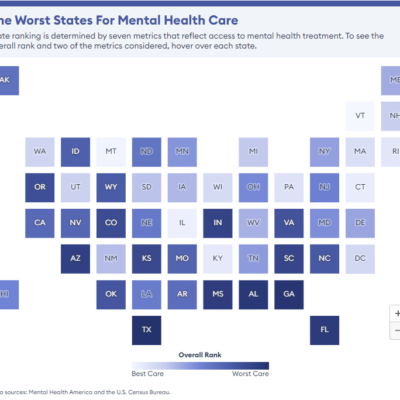Georgia’s Mental Health Crisis and CSBMG’s Commitment to Change

Erica Stokes| July 17, 2024
While numerous positive advancements have been made in recent years, the mental health landscape in Georgia remains in a dire state. As highlighted by recent statistics. According to Forbes Advisor, Georgia ranks as the second worst state for mental health care in the country, just behind Texas (Boyce, 2024). With a staggering 34.4% of adults with mental illness lacking access to care due to cost, and the state having the fourth fewest mental health treatment centers (10.05 per 10,000 businesses), Georgia faces significant challenges in providing adequate behavioral health services.
Moreover, the youth in Georgia are severely impacted by these shortcomings. Approximately 66.6% of youths with depression do not receive care from mental health services, placing Georgia seventh highest in the nation for this distressing statistic (Boyce, 2024). The lack of mental health services for young people is particularly concerning given the increase in suicide rates, which have risen by around 36% from 2000 to 2022, with one death occurring every 11 minutes on average (Boyce, 2024).
While acknowledging these alarming statistics, the Community Service Board of Middle Georgia (CSBMG) remains dedicated to improving mental health outcomes across our catchment area in middle and southeastern Georgia. CSBMG is actively working to expand access to quality behavioral health services by moving to a Certified Community Behavioral Health Center (CCBHC) model of care, with a special focus on children and youth, the substance use disorder (SUD) population, crisis services, and Jail In-Reach services, to name a few.
Initiatives for Children and Youth
CSBMG’s efforts to support children and youth are exemplified through programs like our SOAR Clubhouse which provides a safe and nurturing environment for young people to develop essential life skills and receive mental health support. Additionally, the agency offers a variety of telehealth services to ensure that children and adolescents in remote areas have access to mental health care, regardless of their location.
Support for the SUD Population
For individuals struggling with substance use or misuse disorders, CSBMG’s RISEUP program offers comprehensive addiction recovery peer support. This slate of activities and services offered includes peer-led support groups, educational workshops, and job skills training, and provides a holistic approach to recovery. By addressing the root causes of addiction and offering practical resources, CSBMG helps individuals achieve and maintain sobriety through all pathways to recovery.
Jail In-Reach Programs
CSBMG’s Jail In-Reach program is another critical component of our commitment to improving mental health care in the rural areas we serve. This program provides incarcerated individuals with access to mental health and substance use disorder services, with emphasis on helping them transition back into the community successfully. By offering support within the jail system, CSBMG aims to reduce recidivism rates and promote long-term recovery.
A Positive Path Forward
Despite the challenges highlighted by Forbes Advisor, CSBMG is making significant strides in moving the needle towards better mental health care in Georgia. Through our inclusive practices, innovative programs, and community partnerships, CSBMG is creating a supportive and equitable environment for mental health and substance use recovery. Our commitment to addressing mental health challenges head-on is an inspiring example of how dedicated efforts can lead to meaningful change.
By focusing on the unique needs of children and youth, the SUD population, and incarcerated individuals, CSBMG is ensuring that all members of the community have access to the care they need. As these initiatives continue to grow and evolve, not just in our area, but across Georgia, there is hope that Georgia’s mental health rankings will improve and that more individuals will receive services and support they deserve.
References
Boyce, H. (2024, May 7). Only one state is worse than Georgia for mental health care. Forbes Advisor. Retrieved from Forbes
